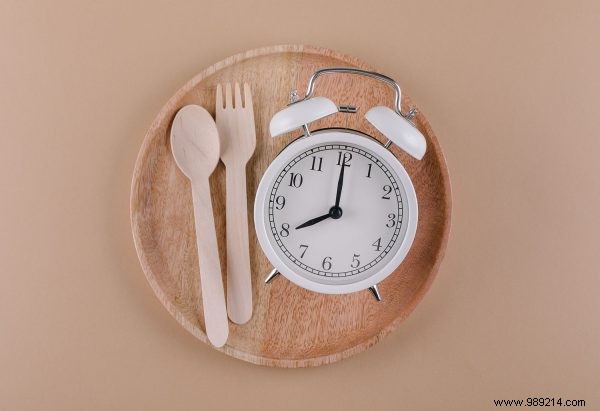
Sports fan Mirte takes us into the wonderful world of intermittent fasting. Something she finds both idiotic and interesting.
Myrtle: “When I was little, it was insisted that you have to have breakfast in the morning. Breakfast is the most important meal of the day. Those who didn't have breakfast were a bit of the pariahs of the group and at the very least didn't have very sensible parents.
I don't think anything has really changed in this way of thinking over the years. On the news I see our Willem and Maxima once a year eating a sandwich with chocolate sprinkles at a primary school in Schubbekutteveen. Are they there setting a 'good example' on those child seats that are too small.
I myself was always of the opinion that breakfast was important. After eight hours of sleep, your body could use something, right? Your metabolism needs to get going again, you need energy to start the day. I was (and am?) of the opinion that in the morning without my oatmeal porridge I am a kind of sleeping zombie. Sleeping and zombie? Yes, it is that bad.
What is intermittent fasting?
On the Laska site I read an article about intermittent fasting † Intermittent fasting involves putting your body into a fasting state. In any case, you will not eat anything for more than 12 hours. For example, you eat your dinner at 19.00, only to have lunch again the next day at 12.00. Then you have a fasting time of 17 hours and a eating time (also called a 'feeding window') of 7 hours. But why the hell would you do that? First, take a look at Laska's body. Second, there are all kinds of health benefits to intermittent fasting assigned.
The benefits of intermittent fasting
When you eat 'normally', your body is always busy digesting and processing food. When you put your body into a fasting state, your body goes into a kind of survival mode. To ensure that you survive this 'starvation', your body will put more energy into investing and maintaining the cells.
In the book The food hourglass, the author Kris Verburgh discusses calorie restriction and fasting:
“Scientifically, there is only one method that can significantly slow down the aging process and that has to do with our diet. This intervention is called calorie restriction. Calorie restriction means that a person eats about a quarter less than he normally needs. The book the Food Hourglass can be found here .
Calorie restriction was discovered by Clive McCay, a biochemist and researcher at Cornel University. He wanted to know what would happen if you gave rats little food for much of their lives. He expected that his rats would die sooner because they never get enough to eat, but the opposite was true. The lifespan of the rats increased and this increase in lifespan was proportional to the degree of calorie restriction. With severe calorie restriction, where the rats were fed less than half of what they normally need, the lifespan increased from 1000 days to 1800 days, which corresponds to a lifespan for humans of 150 years."
Fortunately we are not rats, but research has also been done on a more related animal species:the rhesus monkey. “For 20 years, these rhesus monkeys ate 30 percent less than 'normal'. After twenty years, 37 percent of the non-calorie-restricted monkeys had died, while only 13 percent of the calorie-restricted monkeys had died. Mortality in the rhesus monkeys subjected to calorie restriction was 3 times lower. The monkeys under calorie restriction also suffered much less from signs of aging such as loss of muscle mass, cancer, heart disease and shrinking brain volume.”
Not only animals benefit from food abstinence. It appears that fasting individuals tend to look young for their age and tend to have healthier body parameters compared to non-calorie restrictive individuals. For example, they have lower blood pressure and better glucose and insulin management.
The difference between calorie restriction and fasting
Calorie restriction and fasting do not necessarily have to be the same. When fasting, you choose to put your body in "survival mode" by not eating at all for a certain amount of time. With calorie restriction you want the same, only you eat continuously but fewer calories than you need. Both come down to 'starving' your body.
Starving?
Now 'starving' doesn't sound very happy to me. I love food, healthy but also unhealthy food. Now my google research has taught me that this can go well with intermittent fasting. See, that sounds a lot better to me. There are Intermittent Fasting people (here's a word) who say that as long as you stick to the fasting period, it doesn't matter what you eat during your 'window'. I don't think it's healthy to stuff yourself with burgers, chips and sweets in 7 hours, but it isn't without intermittent fasting either. But you don't necessarily have to live on chia seeds and goat yogurt to experience the health benefits.
You can only judge if you try it yourself
Although I am a bit skeptical about it, I have also become very curious. I've been training quite intensively for quite some time, with which I've made quite some progress. Unfortunately, at some point you will come to a point where your progression is no longer so fast. Then it might be time for something new.
I have decided to Intermittent Fasting to give it a chance. I'm not saying I'm going to do it for weeks. Maybe I'll only last a day and then eat the whole fridge. But who knows what kind of things it will bring me and I will soon be a convinced Intermittent Fasting'er.
Text:Mirte Rey